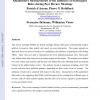Free Online Productivity Tools
i2Speak
i2Symbol
i2OCR
iTex2Img
iWeb2Print
iWeb2Shot
i2Type
iPdf2Split
iPdf2Merge
i2Bopomofo
i2Arabic
i2Style
i2Image
i2PDF
iLatex2Rtf
Sci2ools
120
click to vote
CORR
2006
Springer
2006
Springer
Quantitative Measurements of the Influence of Participant Roles during Peer Review Meetings
Peer review meetings (PRMs) are formal meetings during which peers systematically analyze artifacts to improve their quality and report on non-conformities. This paper presents an approach based on protocol analysis for quantifying the influence of participant roles during PRMs. Three views are used to characterize the seven defined participant roles. The project view defines three roles supervisor, procedure expert and developer. The meeting view defines two roles: author and reviewer, and the task view defines the roles reflecting direct and indirect interest in the artifact under review. The analysis, based on log-linear modeling, shows that review activities have different patterns, depending on their focus: form or content. The influence of each role is analyzed with respect to this focus. Interpretation of the quantitative data leads to the suggestion that PRMs could be improved by creating three different types of reviews, each of which collects together specific roles: form re...
| Added | 11 Dec 2010 |
| Updated | 11 Dec 2010 |
| Type | Journal |
| Year | 2006 |
| Where | CORR |
| Authors | Patrick d'Astous, Pierre N. Robillard, Françoise Détienne, Willemien Visser |
Comments (0)

